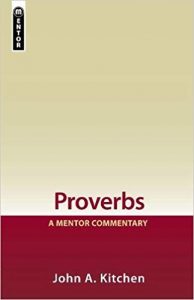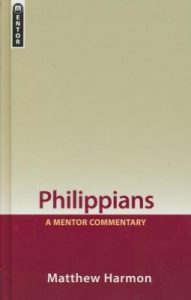Mentor commentaries are biblical studies reference books that are written for professors, pastors, and lay people who can read and follow mid-level discussions on the interpretation of Scripture and Christian theology.
Mentor commentaries are not technical because the authors are not directly exegeting the Hebrew and Greek text, however, their interpretations are built upon insights from the original languages.

Volumes in the Mentor series reflect Reformed theology.
Mentor authors do not shy away from showing their hearts as servants of Christ, and as pastors of churches, in their commentaries, so the end result is an in-depth study of the biblical text that is rich in passion for the things of Christ.
Which commentary series is best for your purposes? See Best Bible Commentaries: Top 50. Based on aggregate reviews.
Mentor Bible Commentaries (MEN): Reviews
Mentor commentaries have received numerous positive reviews from bible scholars and Christian pastors.
Bible scholar Alec Motyer praised the Leviticus volume, saying:
Dr. Vasholz claims that Leviticus, far from being a book to avoid or skip over, is of basic importance to the Bible and to our understanding of what it teaches. His commentary proves the claim to the hilt. It is a high treat to enter into huge scholarship wedded to patient, detailed explanation and exposition of the sacred text. Here is Leviticus brought out of obscurity into the light, off the sidelines into the mainstream. The patience of his scholarship calls for patience in our reading, and rewards it.
Bible scholar Bruce Waltke praised the 1-2 Chronicles volume, saying:
Richard Pratt’s exemplary commentary is systematic, scholarly, sober and simple. . . . Professor Pratt’s style is simple and clear . . . he sketches the complicated lineage of the high priesthood . . . so clearly that any reader can discern at a glance the lay of the land.
Robert B. Chisholm Jr., chair and professor of Old Testament studies, Dallas Theological Seminary, has praised the Ezra and Nehemiah volume saying:
Tiberius Rata has provided the church with a clearly written, insightful synthesis of the often-neglected books of Ezra and Nehemiah. The author’s style is concise and readable; he stays on track and refuses to deviate from his primary goal of illuminating the meaning and significance of the biblical text.
One of the most useful features of this volume is its attention to contemporary relevance. Without violating the meaning of the ancient text in its context, the author derives helpful practical insights that are consistent with its original intention.

Author Interviews from the Mentor series on Best Bible Commentaries
A few Mentor authors have been kind enough to participate in Q & A interviews on their commentaries with Best Bible Commentaries. Please follow the provided links to read the interviews.
Richard Pratt on 1 and 2 Chronicles:
Preview: “As one of the last Old Testament books to be written, Chronicles is a prelude to the Christian faith. The Chronilcler’s hopes are fulfilled by Christ. His themes readily apply to the Christian life.”
Tiberius Rata on Ezra and Nehemiah:
Preview: “You hear a lot about the lost 10 tribes of Israel. Ezra-Nehemiah is clear that all tribes were represented at the return from exile.”
More Mentor interviews on Best Bible Commentaries:
Volumes of the Mentor Commentary Series
The links below go to Amazon, which sells new and used books.
John Currid, Carl McMurray Professor of Old Testament, Reformed Theological Seminary, Charlotte, North Carolina:
“Professor Mackay has produced a strong commentary on the Book of Exodus. It is filled with excellent material for the pastor and the serious-minded Bible student.
I especially appreciate the work on application that is normally so difficult to draw out of historical literature. I recommend this work highly. It is a valuable tool for the study of this most important period in Israel’s history.”
Michael A Grisanti, Professor of Old Testament, The Master’s Seminary:
“Vasholz’s commentary on Leviticus provides another helpful resource for students of the Scriptures.
His work on this often-neglected biblical book will take its place next to a comparatively small group of commentaries that combine an evangelical focus, a high view of Scripture, careful attention to the text, and an avoidance of overemphasis on symbolism and typology.
Throughout the volume, he interacts with other commentaries on Leviticus as well as various monographs, writes clearly in an expositional fashion, and provides helpful explanations of a book whose meaning and importance eludes many of its readers.”
1 and 2 Chronicles – Richard Pratt
Ezra and Nehemiah – Tiberius Rata
John J. Davis, president/professor emeritus, Grace College and Grace Theological Seminary:
“This commentary on Ezra and Nehemiah is superbly written, beautifully illustrated and carefully documented. Dr. Rata has provided the student of Scripture with a thoughtful commentary on Ezra and Nehemiah that is holistic in approach.
He skillfully weaves together matters of the Hebrew text, historical backgrounds, theology and archaeological discoveries. Also not forgotten are the practical needs of the contemporary Christian.
This is a book suitable for the classroom, pastor’s office, or the scholar’s study.”
Richard P. Belcher Jr., professor of Old Testament, Reformed Theological Seminary:
“Harman’s commentary on the Psalms is a solid exposition of the Psalms. The focus is on the original meaning of the psalms with clear explanations of the message of each psalm through an analysis of structure, key words, and the flow of the psalm.
And yet, the meaning of the psalms for God’s people today is also emphasized by showing important connections to the New Testament. The reader will discover the rich treasures in the Psalms through the use of this commentary.”
Philip H. Eveson, former principal, London Theological Seminary:
“Allan Harman’s commentary is the fruit of a lifetime’s study of the Psalter and provides a well-informed, reliable guide to the vast literature on the subject.
The extensive introduction is itself worth its weight in gold while the Scripture text is opened up in a clear, careful, and devout way.”
C. J. Mahaney, President, Sovereign Grace Ministries:
“This is my favorite commentary on Proverbs.”
Daniel J. Estes, Dean of the Biblical & Theological Studies Department, Cedarville University:
“In this commentary on Proverbs, John Kitchen combines careful attention to the text with a warm pastoral concern for his readers.
He is familiar with the scholarly discussions on the book, but he avoids technical jargon as he interprets Proverbs for the life setting of the twenty-first century.
His lucid exposition expertly focuses on two questions that are too often neglected: How does the message of Proverbs connect with other biblical passages? And, how does this ancient book speak in specific terms to life today? This book will prove helpful for laypeople, students, and scholars alike.”
David L. Larsen, Professor Emeritus of Preaching, Trinity Evangelical Divinity School:
“He is clear and probing on the text and always practical. His appendix on wisdom versus folly is powerful and his thematic index of Proverbs opens up the only real preaching possibility for expositors beyond chapter nine of the book.
Strings of pearls cannot be taught or preached verse by verse. This is a solid and substantial piece of work, which will deservedly take its place as one of the finest contemporary treatments available.”
Jeremiah, Vol. 1 – John L. McKay
The Gospel Magazine:
“The commentary is as full as is reasonably possible, verse by verse, often word by word, and covers every question likely to be raised.”
Jeremiah, Vol. 2 – John L. McKay
Alec Motyer, author of Isaiah in the Tyndale Commentaries:
“Professor Mackay’s commentary on Jeremiah is trebly welcome: first, from his earlier work on Exodus (in this series) we know that he will take the highest view of Scripture as the Word of God.
Secondly, he argues cogently for Jeremiah as author of the whole, contending that the book as we have it represents written records contemporary with the prophet’s preaching.
Thirdly, from the start he is concerned to handle the book of Jeremiah, not as an anthology, but as unfolding a unified message.
Lovers of Hebrew will find a kindred spirit in Professor Mackay. Those without Hebrew will find a patient teacher leaving no stone unturned to make the word of God plain.”
2009 Preaching Survey of Bibles and Bible References:
“John MacKay’s Lamentations is a good commentary for preaching. MacKay is aware of the issues but does not get bogged down in technicalities. Lamentations often is neglected, so this will be helpful.”
Tim Chester, pastor, The Crowded House, Sheffield:
“John L. Mackay’s . . . commentary on Hosea is a rare thing: a commentary that is both scholarly and readable. The engagement with the text is thorough without ever getting over-complicated while the prose is consistently clear and vibrant.
Even though all the questions you want addressed are addressed, you never feel like you are losing sight of the big picture. Hosea’s message of God’s deep love for his people and his covenantal commitment to them shine through.
Meanwhile the regular reflection sections point in the direction of contemporary application. Preachers will find it a valuable guide to preaching Hosea.”
Joel and Obadiah – Irvin Busenitz
Geoffrey Grogan, translator for the New King James Version:
“This is a fine commentary, exhibiting careful and balanced Old Testament scholarship expressed in attractive, vigorous prose.
I did not find a sentence that was not clear: controversial issues affecting interpretation are well handled—for example the question as to whether the locusts in Joel 2 are literal or picture an invading army.
The author argues well for an early date for Joel while recognizing the complexity of the issue and presenting contrary viewpoints clearly and fairly.”
Tremper Longman III, Old Testament scholar and author of Daniel in the NIV Application Commentary:
“Smith has produced a magisterial treatment of the book of Amos.”
Matthew, Vol. 1 – Knox Chamblin
Jonathan T. Pennington, assistant professor of New Testament interpretation, The Southern Baptist Theological Seminary, Louisville, KY:
“This thoughtful and thorough commentary on the First Gospel comes from a scholar who has obviously spent many years at the feet of Matthew the teacher, and even more importantly, at the feet of the one to whom Matthew bears witness.”

